Lessons learned: what the pandemic taught us about health, perseverance, and what is eternal
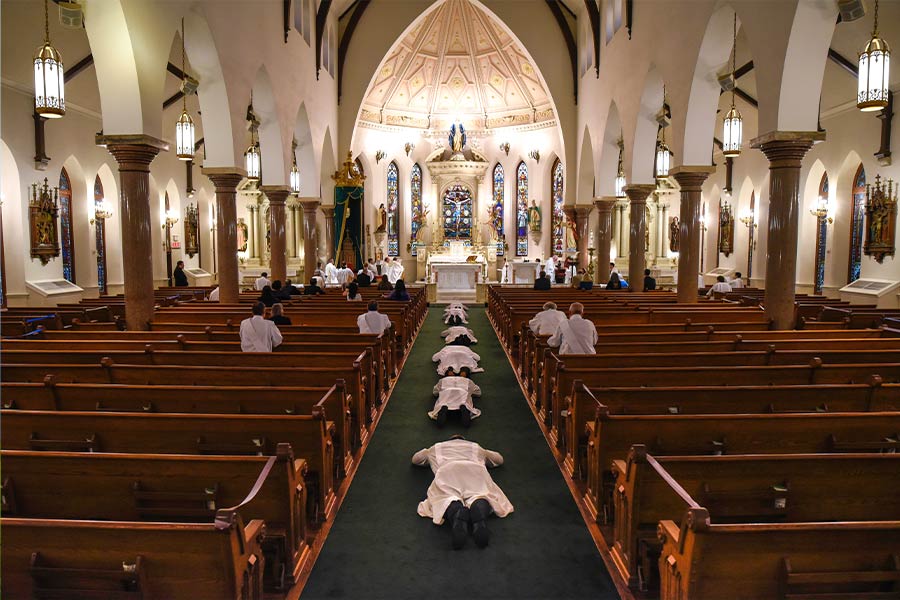
MARCH 2020 - On March 19, 2020, Bishop Michael Olson ordained six men to the transitional diaconate in the diocese in a nearly empty St. Patrick Cathedral. The bishop called the occasion “a great event of hope in the midst of a pandemic.” (NTC/Ben Torres)
It’s not over yet, but we’ve learned a little. Maybe a lot.
The global COVID-19 pandemic, declared nearly 20 months ago by the World Health Organization, still affects how we work, go to school, and worship.
Although many of us (including me) thought this chapter might have ended by now, diocesan schools and parish ministries including religious education begin the 2021-22 school year still impacted by heightened precautions to protect public health. Fortunately, the difficult journey with the coronavirus has taught us lessons that will be invaluable as schools and parishes resumed activities in person this fall.
Who we are
Being deprived of the ability to attend Mass, especially during the 2020 Triduum, made the importance of the full celebration of the Sunday Eucharist painfully clear. Father Jonathan Wallis, who serves three roles within the diocese: vicar general, director of seminarian formation, and chaplain and director of the Newman Center at TCU, said, “Worship of God is essential to who we are as His creation.”
Jodie Rios, a parishioner at Immaculate Conception Church in Denton, experienced that firsthand when she and her husband, a cancer survivor with compromised lung function, shifted to participating in Mass via livestream. “We need to be really careful,” explained Rios on why they restructured their lives to avoid crowds.
A longtime lector and Eucharistic minister, Rios said, “Watching Mass on television made me tear up just about every week at first – maybe for fear we’d never get back to normal.” The two viewed a livestream Mass every Sunday for 14 months.
After getting vaccinated, Rios and her husband selected a Mass likely to have fewer people and returned to the congregation in May, wearing masks for extra protection. She admitted that after their lengthy absence, worshipping with others felt “weird and surreal.”
But, she said, it was “good to see everyone again, and a joy to receive the Eucharist. We really, really, really missed the Eucharist.”
In the first weeks of the pandemic, when gatherings were limited to minimize the transmission of the virus – at first to 250 people, and later reduced to as few as 10 – Bishop Michael Olson and other diocesan officials wanted to make certain Catholics in the Diocese of Fort Worth had access to the sacraments while enacting measures to protect the health and well-being of the community.
Amidst the unknowns that made decision making a challenge, communication was key. Bishop Olson spoke with the county judges of all 28 counties within the diocese as well as local health officials, state government authorities, his brother bishops, and hospital administrators. He kept his pastors informed about the rapidly changing protocols with weekly virtual meetings.
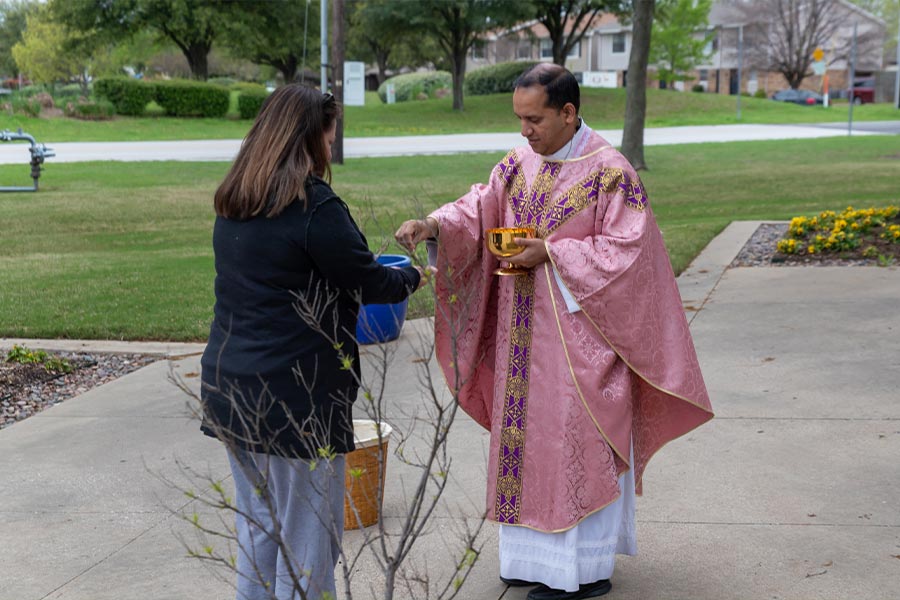
MARCH 2020 - Father Sojan George distributes the Holy Eucharist outside St. Francis of Assisi Church in Grapevine on March 21, 2020. “Stay-at-home” orders put a stop to the public distribution of the Eucharist the following week. (NTC/Joseph Barringhaus)
For six weeks, Mass was celebrated sine populo, or without a congregation present, and livestreamed via social media platforms and parish websites. Some parishes offered Reconciliation outdoors, and many priests were able to perform the Anointing of the Sick in hospitals by wearing personal protective equipment.
One of the many decisions made in the early days of the pandemic was to proceed with the ordination of six men to the transitional diaconate on March 19, 2020, in a nearly empty St. Patrick Cathedral. Fr. Wallis said holding the ordination demonstrated “this is an important act of the Church, and it can happen safely.”
The Church “has her own standing” and partners with government to serve the common good, but is not subservient to it, noted Fr. Wallis.
On the weekend of May 2-3, 2020, which was the earliest opportunity, parishes in the diocese reopened for public celebration of the Mass. The Diocese of Fort Worth was on the vanguard of reopening its doors to public worship, both among Catholic dioceses and other denominations.
Fr. Wallis said returning to public worship as soon as safety protocols were in place was a priority for the diocese because Catholicism teaches: “The human person is composed of body and soul, both. We have real physical concerns, and we have spiritual concerns. And those two things always have to be taken into account, together.”
A faithful response
Like a business, parishes and schools have regular bills due and employees to be paid.
The diocese did not apply for a paycheck protection program loan, and Bishop Olson requested that pastors and schools only apply for government assistance if they had significant need in the initial weeks when parishioners could not attend Mass. A small subgroup of individual parishes and schools requested a paycheck protection program loan, and some others took advantage of interest-free loans that the diocese offered for short-term help.
But during 2020, parishes in the diocese experienced only a minimal drop in contributions overall. The people of the diocese kept supporting the mission of the Church monetarily, according to Don Wagner, chief financial officer for the Diocese of Fort Worth.
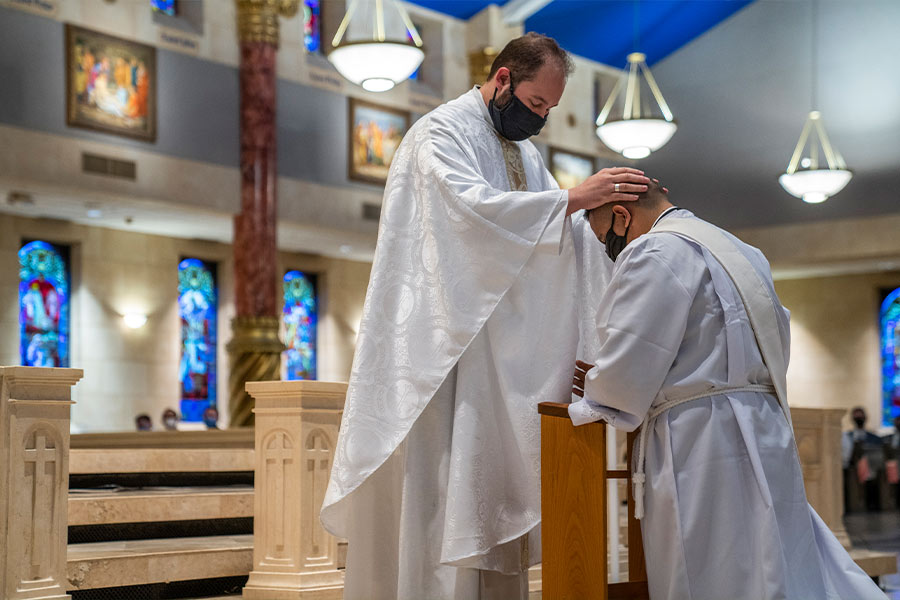
JUNE 2020 - When Father Pedro Martinez was ordained to the priesthood on June 29, 2020, sitting every other pew and wearing masks was the norm. (NTC/Juan Guajardo)
Pastors in the diocese observed that the faithful not only continued their financial support, but they also were cooperative with the four main health measures enacted: mask wearing, hand sanitizing, social distancing, and Holy Communion in the hand.
Fr. Wallis noticed that decisions, both in their formation and their execution, have resulted in discussions and disagreements, but not division, which he found encouraging. “It’s the response of us, together. Too, too, too often we have people who like to put various groups in the Church in opposition to each other…. The people of God is everyone. And I think that’s how, here in the diocese, we went through the pandemic — together.. . . What became very clear to me during this time was we need God, and we need each other.”
Creative community
In the fall of 2020, religious education was taught by livestream, or for parishes in communities without reliable internet, religious education directors provided packets for students to complete at home. Conferences and retreats were cancelled.
Throughout the pandemic, some youth ministers got “really creative,” recalled Victoria Ramon, associate director of youth and young adult ministries. Some managed to have scavenger hunts, praise and worship music, or guest speakers, all via Zoom. “They all, within the means of their parish, did the best that they could,” she said.
Still, attendance declined for religious education and sacramental preparation last year.
Ramon said, “In a lot of places, those groups are a little bit smaller, so we’ve encouraged our parishes to gather them back together, start to build that community again.
“For our young people who have been away from their school community, or their sport community, or even their own extended family for so long, it can go from solitude to loneliness. We want to encourage them and let them know, ‘You’re not alone, you’re not meant to be isolated. This Church is your family,’” she continued.
Cassie Erazo, director of youth ministry at Sacred Heart Parish in Wichita Falls, said when the diocese recommended youth activities return in person in April, planning took more time. She had to think of activities that would engage the students, keep them spaced apart, and have a catechetical component.
A first step was to separate the middle and high school students, who previously participated in youth ministry activities together. Erazo anticipates maintaining the smaller groups through the fall.
Her creative solutions have included exploring the devotion of the Sacred Heart through some unconventional means: cookie decorating, a painting night, and tie-dying t-shirts.
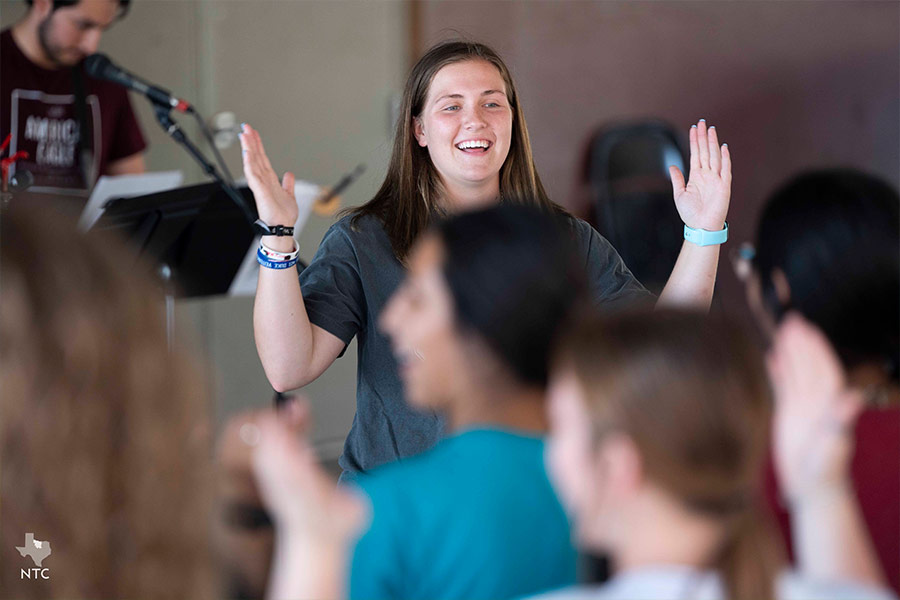
APRIL 2021 - In April 2021, the diocese encouraged parishes to resume in-person faith formation. Below, youth from the Northwest Deanery gather for a worship night on August 1. (NTC/Jayme Donahue)
Cautious Optimism
Nancy Eder, diocesan school nurse consultant, anticipated coronavirus numbers would rise after July 4. She was right.
Now, she’s “cautiously optimistic” about resuming school and extracurriculars. “We will try to resume activities as much as possible,” she said. She has helped track coronavirus cases in schools and parishes throughout the pandemic, which is an ongoing task.
Eder anticipates it may be another year before schools and parish activities are completely “back to normal,” but she noted that the current situation differs greatly from a year ago. “We know how it looks now; we know how it acts now; and we’re grateful for vaccines,” she explained.
Reflecting back a year, when Eder worked with school administrators and diocesan officials to determine how to safely open, she “leaned on God. He was right beside me. He led me in the process to learn, to understand this disease. It was a journey.
“We don’t have all the answers, but we ask and trust God to lead us in the right direction,” she said.
Fr. Wallis concurred. “At the time, nobody had all the information; nobody had a clear road map.”
Last year, the policies enacted proved effective in mitigating the spread of coronavirus and other contagions in schools and parishes. Bishop Olson told diocesan teachers at the August 11 convocation, “Our protocols worked, even before the development of the vaccines. This should be a cause for our confidence…. We have science, we have experience, and we have confident preparation.”
If an increase in COVID-19 cases necessitates increased health precautions, “We will be on familiar ground,” said Fr. Wallis. “But the bishop has stated on several occasions, ‘We are not closing churches again.’ We need God.”
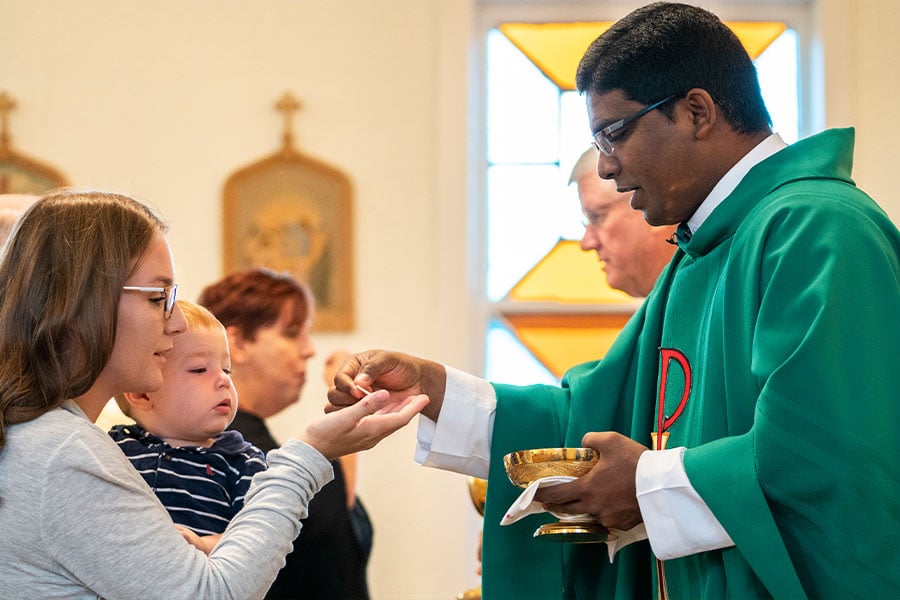
MAY 2021: The mask mandate for all parishes in the diocese was lifted the first weekend in May. For rural parishes in counties with high rates of vaccination, such as St. Mary of the Assumption in Megargel, above, masks became optional in April 2021. (NTC/Juan Guajardo)
Built on eternal truth
Everyone has been affected by the pandemic. Everyone has been changed by it, for better or for worse. And everyone has learned from it, even if the lessons are painful.
Fr. Wallis, in his role as TCU chaplain, observed college students were confronted with profound truths they may not have contemplated. He said, “In an instant, especially the freshmen last year, their whole lives were turned upside down. All of the things that it seemed they would have, like senior prom, graduation, all that was gone.
“But for that moment, it became very clear, what can change and what’s eternal. There was such an openness to [the realization that] God is eternal — to build our lives on that.”
That’s a lesson he hopes remains with the college students and with the greater Catholic community.
“And so, I would say that we not become forgetful of that truth as things begin to go back to normal, whatever that means. That so much of what seems permanent in this world isn’t, and for one moment we saw that,” Fr. Wallis continued. “To not forget that things here change, but God never changes. And so to never forget that a life built upon Him is a life built for eternity. It’s a gateway to eternity if we build our lives on that truth.”
